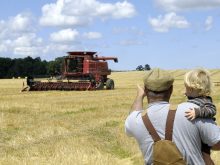ON THE face of it, rural issues appear these days to be getting more sympathetic attention within the federal political system than at any time in years.
Yet this attention could backfire. There also is growing urban advocate criticism of the influence rural issues have in the national debates.
First, consider the newfound attention to things rural. The Senate agriculture committee will spend much of the year touring rural areas for public hearings on rural poverty issues. The committee interim pre-Christmas report already has shone a light and the rural hearings will intensify it.
Read Also

Crop profitability looks grim in new outlook
With grain prices depressed, returns per acre are looking dismal on all the major crops with some significantly worse than others.
Meanwhile, Liberal leader Stéphane Dion has taken the unusual step of naming veteran New Brunswick MP Charles Hubbard as a separate rural affairs critic within his shadow cabinet, reflecting the decision by delegates at the December party convention to call for a stand-alone rural affairs minister and department in Ottawa.
Across the parliamentary aisle, Stephen Harper leads a Conservative government that arguably has a higher proportion of rural MPs than any government since the 19th century. A Conservative MP once joked that Conservative caucus meetings are more like rural caucus meetings.
In its analysis, the Senate agriculture committee argued that rural poverty, like many rural problems, is largely invisible to an increasingly urban country.
Its work, said the report, is “to begin the process of giving rural Canadians and the rural poor in particular a voice, of making them a little more visible.”
Rural MPs like Prince Edward Island’s Wayne Easter regularly complain that rural issues do not get sufficient political attention because urban-based media do not understand and therefore rarely cover them in a more than superficial way.
Don’t tell that to Toronto urban planner Joe Berridge. Several years ago, the Urban Strategies Inc. partner used a panel discussion about Toronto to complain about a political system bias toward rural issues.
He did a topic search on debates in the previous Parliament and found that rural topics were raised by MPs almost six times more often than urban topics such as public transit or homelessness.
Meanwhile, voters in rural ridings continue to have far more voice than is proportionate to the numbers because rural seats have fewer voters. Therefore in any debate that pits rural against urban interests, he said, the rural view is overrepresented.
Berridge said it makes the present political system “irrelevant” and unable to properly deal with the challenges of cities.
He didn’t mention that cities are a provincial jurisdiction so federal debates tend to deal with things Ottawa can influence.
But his is not a lone voice.
This week, the Institute for Research on Public Policy joined the debate from another angle, arguing that rural overrepresentation in Parliament means visible minority issues are poorly represented because most live in cities.
The prestigious Montreal-based think tank recommends narrowing the gap between rural and urban voters lists, effectively making rural ridings bigger, and adding House of Commons seats from cities to rebalance the urban-rural split.
Complaints about rural overrepresentation surely will not go away. Calls for reform will grow. And all the newfound focus on rural issues may turn out to be a curse in disguise.














